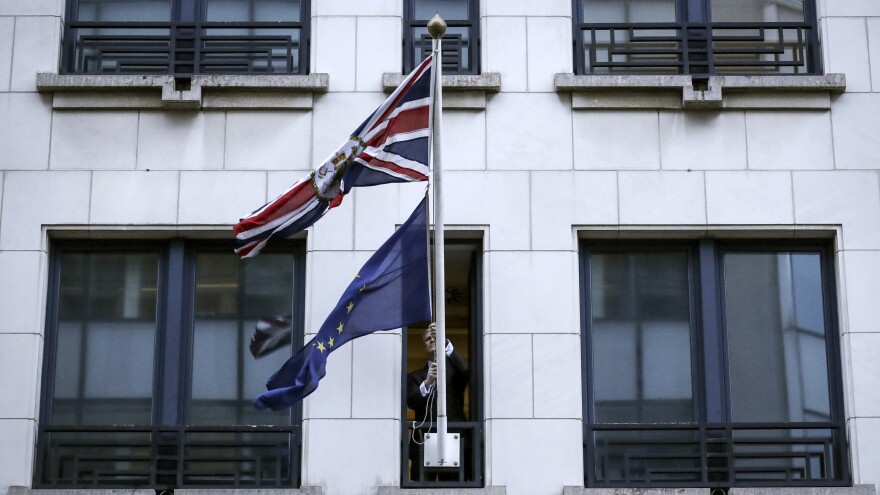Updated at 6 p.m. ET
You'll be forgiven if you still don't quite believe it.
By this reporter's very rough tally, NPR has run well over 1,000 pieces about Brexit -- both on air and online — since the U.K. shocked the world with its vote to leave the European Union more than 3 1/2 years ago. And not one of those stories could responsibly utter this simple, definitive statement: Brexit is happening today.
Yet here we are, at long last. As of 11 p.m. GMT (6 p.m. ET) Friday, the U.K. has shoved off from the multinational bloc and its 27 remaining member states and, for the first time since 1973 (when it joined the predecessor European Economic Community), set off on its own — to a degree, at least.
As NPR's Frank Langfitt explained in this thorough primer, the deadline does not immediately halt the flow of people and goods between the divorced parties. Instead, it ushers in a transitional period through the end of the year, during which time Britons will enjoy many of the same rights as they did before the deadline, while British and European representatives continue to hash out the details of a permanent trade deal that so far has eluded them.
Still, for a journey this fraught and winding, Friday has offered a massive milestone — one that politicians and residents on both sides of the English Channel marked in myriad ways, ranging from consternation to celebration.
Today is the day the UK is leaving the EU. pic.twitter.com/Zuhzl0l5sT
— UK Prime Minister (@10DowningStreet) January 31, 2020
Observers know well which reaction to expect at No. 10 Downing St. It is there, at the British prime minister's residence in London, that Boris Johnson feted the U.K.'s departure with a party for his Cabinet and a televised address to his country.
"This is the moment when the dawn breaks and the curtain goes up on a new act," the prime minister said in his prepared remarks. "It is a moment of real national renewal and change."
Few have tied their political fortunes more closely to Brexit than Johnson, one of the principal leaders of the 2016 campaign to leave the EU. The prominent "Brexiteer" resigned as foreign secretary in 2018 to signal his disgust with the withdrawal agreement reached by Prime Minister Theresa May and then replaced her after she stepped down.
Johnson's early tenure was marked by a string of defeats as he tried to push for a departure, one way or another, but his attempts to "Get Brexit Done" grew much easier with a landslide victory in last month's parliamentary elections.
Still, even as Brexit supporters gathered for parties in London and across the country, not everyone is cheering the prime minister's hard-won victory lap Friday — far from it, in fact. Hours before the deadline, throngs of pro-EU demonstrators gathered on Downing Street and near the Houses of Parliament in Westminster to register their objections to the coming divorce.

Farther north, in Edinburgh, Scottish First Minister Nicola Sturgeon laid out her own objections Friday — and made the case why those objections warrant a second independence referendum for Scotland, roughly 5 1/2 years after voters decided to remain in the U.K.
"We know that change is coming, but it does not have to be the change that Tories want to impose on Scotland. A new independence referendum will put the decision about the best path for Scotland into our own hands," she said. "And there is a cast-iron mandate from both the public and from Scottish Parliament for that referendum."
Just one day earlier in Edinburgh, Scottish lawmakers voted 64 to 54 to back a nonbinding call for a new independence referendum, saying that Brexit had so thoroughly changed the political landscape that voters deserve another ballot.
Ministers in London, though, remain unmoved. Earlier this month, a couple of weeks even before the vote in Scottish Parliament, Johnson's government rejected Sturgeon's proposal, saying such a vote would merely "continue the political stagnation Scotland has seen for the past decade."
The Scottish first minister, in her speech Friday, acknowledged that the path forward for independence-minded Scots would not be easy.
"To achieve independence, a referendum, whenever it happens — whether it is this year as I want, or after the next Scottish election — must be legal and legitimate. That is a simple fact," she said. "It must demonstrate clearly that there is majority support for independence, and its legality must be beyond doubt. Otherwise the outcome, even if successful, would not be recognized by other countries."
As for those other countries, the reaction Friday's Brexit was guarded. In Europe, German Chancellor Angela Merkel called Brexit day a "profound watershed moment" and promised good-faith negotiations going forward, while French President Emmanuel Macron, speaking in Paris, described the U.K.'s departure as an "alarm signal" that demands to be heard across the continent.
Macron reiterated his assertion that the 2016 "Leave" campaign was filled with "lies, exaggeration, simplifications and checks that were promised and that will never arrive" — but also said Brexit reflected that Europe can only progress with significant reforms.
Despite the lofty words of leaders on both sides of the divide that just deepen further, perhaps the most vivid moments of the day came without words entirely. The British diplomatic post in Brussels, the seat of the EU, quietly removed the bloc's flag at the close of the business day.

Elsewhere in Brussels, EU officials returned the symbolic gesture. A crowd gathered in somber silence outside the European Parliament building, where they watched as officials lowered the Union Jack — and raised the EU's circle of stars to take its spot in the pantheon of members' flags.
Copyright 2020 NPR. To see more, visit https://www.npr.org. 9(MDAyNDY5ODMwMDEyMjg3NjMzMTE1ZjE2MA001))
In silence outside the EU parliament the Union flag is lowered and replaced with an EU flag 🇬🇧 to 🇪🇺 pic.twitter.com/TaaGNUWfQy
— Nicola Bartlett (@NicolaRBartlett) January 31, 2020






